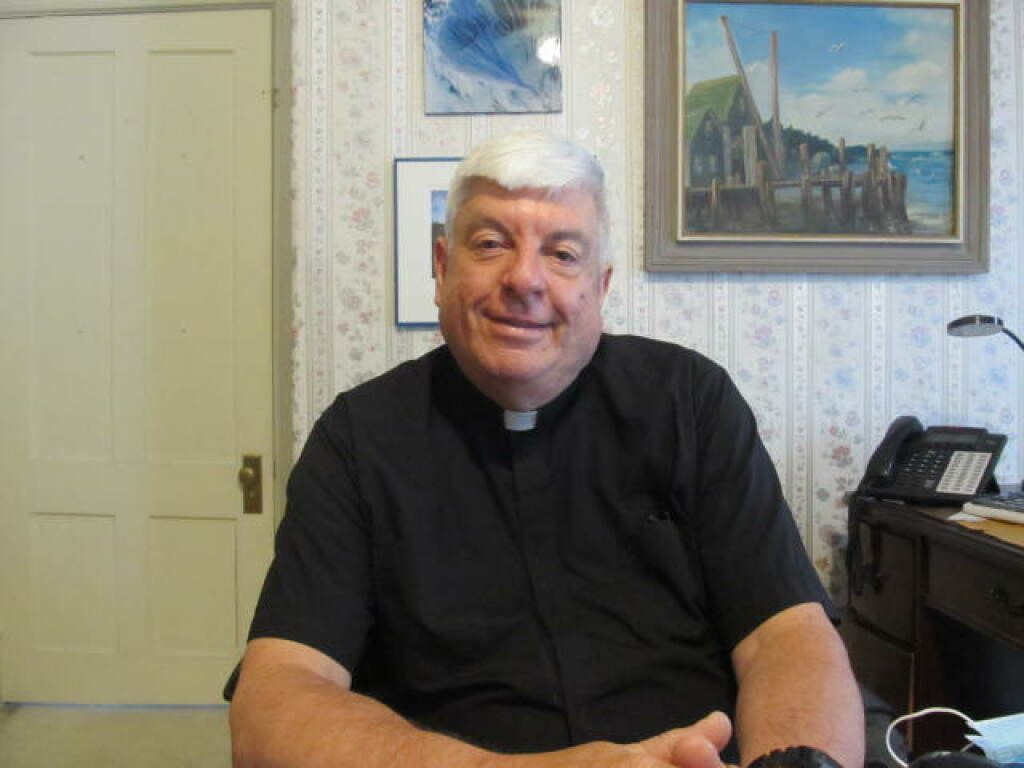 Clinging to the vine and producing good fruit
Clinging to the vine and producing good fruit
Homily for the Fifth Sunday of Easter
May 2, 2021
Since Jesus spoke within a rural community, he naturally used images from farming and raising sheep—images that his audience would readily understand. I recently read a little article about this gospel passage that wondered how Jesus would talk with people today who knew nothing about farming or raising sheep. Here’s what the author came up with from the world of modern computers: he might describe himself as the indispensable software and the one he calls his Father as the mainframe computer.
Of course, whether it’s from the world of agriculture or from the world of computers, there’s the deeper question of what is Jesus getting at with this imagery. Let’s begin with a story.
Shortly after mid-term exams, a student was walking across campus. A friend of her mother’s asked her how she had done. She replied that they were not too tough, except for one professor’s. She said, “Her tests are next to impossible to pass. I have to study much harder for her tests just to keep up my grades.” The friend asked, “But do you learn more from all that studying for her tests, or from the teachers who are not so difficult?” She replied, “Well, yes, I do seem to understand her course better.” Then the friend asked her if she had ever sharpened a knife. She said that her father had taught her how to sharpen a knife when they went on a camping trip. Her friend then asked, “Did you use a stone or a towel?” “What?” she questioned. “You can’t sharpen a knife on a towel!”
“Exactly,” replied the friend. “You can’t sharpen a knife on a towel. A knife can only be sharpened on a hard surface so that it will be sharp enough to fulfill its purpose and cut what needs cutting. Students and children cannot be sharpened only on soft surfaces. They are sharpened on the hard surfaces of teachers and parents, so that they will be sharp enough to ‘cut it’ in life and fulfill their life purpose.”
One of my absolutely favorite stories is about James Garfield, who before becoming the twentieth President of the United States, was the president of a college in Ohio. On day he was approached by the father of a young student seeking admission to the college. The father criticized the length and the difficulty of the coursework. “Can’t you simplify the course work? My son will never get through all this academic work. There should be a shorter route.”
Garfield replied, “I believe I can arrange such a plan, but it all depends upon what you want for your son. When God wants to make an oak tree, he takes a hundred years. And, when God wants to make a squash, he requires only two months.”
Now, getting back to Jesus’ imagery. He is the vine, we are the branches. To have real life, we need to be connected to him. This comes about when we turn to him regularly in prayer, and stay with it long enough so that our heart can be quiet enough to receive what Jesus has to offer us: advice when we are confused, encouragement when we feel like giving up, comfort when life has kicked us in the teeth, a new way of looking at things when we’re at a dead end. It’s not enough to just quickly ask for our latest need or to rattle off some memorized prayers. No, quiet yourself and talk to him about whatever is on your mind or in your heart. Then stay quiet while his heart speaks to yours.
One time, when I was first ordained, I had spent a long time preparing a prayer service for a special occasion. Then, in a church that seats 1,000, only 19 people came. I was, to say the least, disappointed. I asked God: Is this what you called me for? Is this why I was ordained? The following weekend, I was in a penance room, where there was a Bible on a table, and something urged me to break open the Bible and read. So I did. My eyes landed on the last verse of a lesser-known book called “Ecclesiasticus” – or, alternately, Sirach. My eyes happened to fall on the very last verse, verse 30 of chapter 51: “Work at your tasks in due season, and in his own time God will give you your reward.” Whoa! I thought, you mean this prayer thing actually works?
Then there’s the part of Jesus’ words about the branches getting pruned. I know about that from working in our rose garden. If you have dead branches, or a part of the bush that’s not doing well, you cut it off, thereby getting rid of the stuff that’s of no use, and making room so that the healthy parts will grow better. Sometimes, later on, there are branches that get diseased or eaten by bugs. You don’t want that to destroy the whole rest of the plant, so you spray it, and you cut off the part that has no chance of producing something beautiful.
So there are two parts here for us to consider. First, are we connected, spiritually, to Jesus, who is the Source of our life and well-being? And second, do we have some unhealthy stuff, or stuff that’s making part of us half-dead, that we should be dealing with? You can’t always wait for some miracle that’s going to magically make everything better. We need to use our spiritual cutting tool, God’s Word, that gives us all the directions we need—sort of a “Better Homes and Gardens” for the soul. How to live a richer, more beautiful, and more satisfying life—because we’re listening to the right gardener, the expert for our souls.
One final thought. Sometimes we can be absolutely blind about what’s going on in our souls. That’s why it can be helpful to have a wise advisor—a guide, a spiritual director, a confessor, a counselor, a spouse or a good friend. Sometimes, they can see more clearly what’s bothering us, what’s not good for us, what’s healthy and what isn’t. That’s why God places good and caring people in our lives.
So to think and pray about:
- Am I connected to Jesus, as branch to vine?
- Does anything need to be pruned so that my life can be more healthy and beautiful?
- Who could help me to grow and have life more abundantly?
You might also like
Father's Homilies




